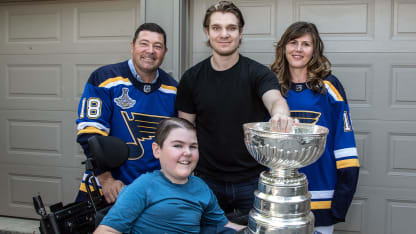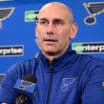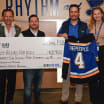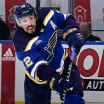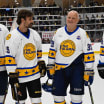As O Canada played, Robert Thomas shifted his gaze from the Canadian flag in the rafters and over to the wheelchair accessible seating section at Budweiser Gardens in London, Ontario.
That's where Owen McGonigal sat. He wore a London Knights jersey with the name "Thomas" and the number "27" stitched across the back, so he was easy to spot. The 13-year-old was the biggest Thomas fan in the building, and because the wheelchair accessible seating was located right next to where all the hockey executives and amateur scouts sat, he also was Thomas' biggest advocate.
How Robert Thomas' billet brother made him a better player and person
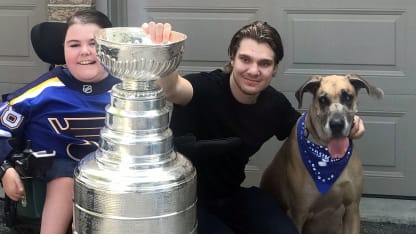
By
Chris Pinkert
St. Louis Blues
"I think a big reason I got drafted so high was because of him," Thomas, a first-round draft pick (No. 20 overall) in 2017, told stlouisblues.com. "The way he talked about me, the way he promoted me to the scouts - I think I got more feedback from him than from anyone else on how the scouts thought I was doing and which teams were taking a good look at me. They would come up and talk to him, and he would listen to them during the games and tell me what they liked about my game and what they didn't."
"It meant so much having that kind of support," Thomas added. "Just having someone there for you and always looking out for you was big."
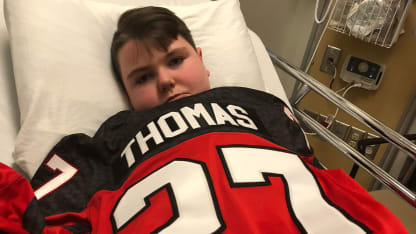
#
THE DIAGNOSIS
Angela McGonigal easily recalls the first time she sensed something wasn't right with her infant son.
Owen was nine months old and he had not yet begin to crawl. He would pull himself into the correct position, but he couldn't seem to get any forward momentum going. Angela had read that children typically crawl regularly around eight to 10 months, and that they also learned to pull themselves up to stand while holding onto furniture around that age, but Owen had never even attempted to stand.
"I took him to the doctor and he looked at me like 'oh, you're just being a paranoid mother," Angela said. "The doctor grabbed that knee-reflex tool to check Owen's reflexes - you know, the one where they whack you on the shin and it causes your leg to jolt - and Owen's leg didn't jolt. He had lost that response in his legs. It was gone."
Owen was taken to the nearby Stollery Children's Hospital in Edmonton later that same day to see a neurologist. After one examination, the neurologist told Angela she believed Owen had spinal muscular atrophy - a genetic disease related to muscular dystrophy that affects the central nervous system, the peripheral nervous system and voluntary muscle movement. According to MDA.org, children with spinal muscular atrophy are lacking a protein necessary for the survival of motor neurons, which send signals between the brain and the skeletal muscles. Patients diagnosed with the disease often have weakened muscles closest to the center of the body, such as the shoulders, hips, thighs and back.
Gradually, throughout his life, Owen's muscles will continue to get weaker. When he was nine years old, he required an eight-hour surgery that fused his spine from the top of his neck to his tailbone, inserting steel rods and 40 screws in his back. Today, now at 15 years old, Owen is confined to a motorized wheelchair and needs help with every part of his daily routine - from getting out of bed to brushing his teeth, eating, getting to school and even taking notes in class… you name it and Owen has challenges associated with it.
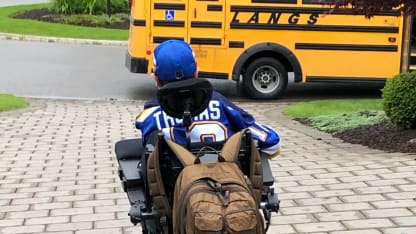
#
OWEN'S WISH
The McGonigals used to live in Edmonton, and it was there where Owen developed a passion for the Edmonton Oilers and the game of hockey. Because the leading specialist for spinal muscular atrophy was located in London, Ontario, the family moved there and Owen was forced to follow the Oilers from afar.
In addition to boasting the leading specialist for Owen's disease, London was also home to the Ontario Hockey League's London Knights - a Canadian junior team that was on the rise when Owen moved to London.
One day, the McGonigals saw a London Knights advertisement that was seeking new families to billet their hockey players. Billet families share their homes with junior hockey players who have moved away from their own homes to pursue hockey careers. Because the Ontario Hockey League drafts players and can even trade them to other teams just like the professional leagues, players get drafted and have to leave home at 15 or 16 years old.
Angela's brother played hockey and lived with a billet family, and her husband, Kevin, had the same experience with his own brother, so the McGonigals began to seriously consider answering the Knights' advertisement.
But was it feasible? With a son already in need of support in every aspect of his daily life, did it make sense to allow a teenage hockey player (or two or three) to move in?
"I want a London Knights player to live at our house," Owen told his parents in support of the idea. "I want to be a brother to him."
Eventually, the McGonigals decided to sign up.
"We wanted to be able to give back," Angela said. "We also thought it would be really good for Owen to see that everybody faces challenges and has adversity in life. Playing hockey might not be something that Owen has in his future, and we thought he might look at life through rose-colored glasses and think 'Well, hockey players have it so easy, they have a perfect life.' We wanted him to see that there is adversity and lots of obstacles to overcome for talented young hockey players as well. We also thought we could benefit a players' development by having him appreciate that there are a lot of challenges in life for other people, too."
This is where Robert Thomas comes into the story.
The Knights sent Thomas, then 16 years old, to live with the McGonigals.
"Robert just took to Owen so easily," Angela recalled. "We met Robert's family for dinner before he moved in just to get to know each other, and Robert was so observant. He noticed the sort of support Owen needed at dinner, and the first day he moved in, when it was dinner time he jumped up to help Owen at the table. It was so heartwarming to see. I think being with Owen has given Robert a lot of confidence for community visits he does with the Blues, such as hospital visits and whatnot. It gave him a bit of experience to go into those difficult situations with self confidence and the right perspective."
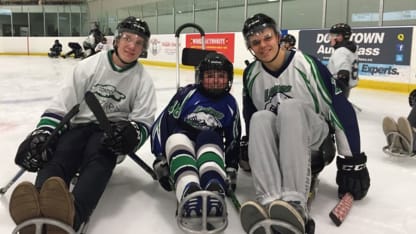
#
A SIGN OF PROGRESS
The medical community has made great strides over the last few years for children living with spinal muscular atrophy.
In the summer of 2016, a treatment was approved for the disease that allows its patients to regain a bit of their muscle strength. Patients who opt for the treatment receive regular spine injections every two weeks in the loading phase. Now, Owen gets an injection every four months to help maintain the strength he still has.
"It's not a cure," Angela said. "But we're very optimistic that there are developments coming that give us hope that Owen will have a less restrictive future than we were originally told to expect."
Shortly after Owen began receiving his initial injections when he was 13 years old, Thomas vividly remembers a moment where Owen displayed incredible progress.
"It was my second year in the OHL and Owen had just started getting treatment," Thomas said. "Until then, he had never been able to hold his head up straight or pick up anything weighing more than an ounce or two. Despite all that and through his treatment, he has always been a special kid. He doesn't let his disability hold him back and doesn't want his condition to affect him or his life. He's always been a believer that he can do anything. One time, I left my soda can across the living room near the TV. I made a comment like 'oh I left my pop over there and now I gotta go get it," and Owen said 'I'll get it!' He drove over there, picked it up with his hand and brought it to me, and he didn't even notice he was doing it! A can of soda had been way too heavy for him a few months earlier. I looked at my billet mom and we looked at each other and we were both so happy for him. Within months, he had made that much progress!"
More recently, a new drug has been developed in the United States that has shown signs of reversing spinal muscular atrophy, but the drug must be administered to patients before they turn two years old for it be effective. Because of his age, Owen isn't eligible for that treatment.
"I'm not sure how much more his condition will improve, but he loves playing sled hockey," Thomas said. "He doesn't have the strength to push himself around, so my billet dad, Kevin, goes onto the ice and pushes him around right now. Owen just controls his stick. He has to tape it to his hand, but he wants to be able to hold it eventually. That's one of his next goals."
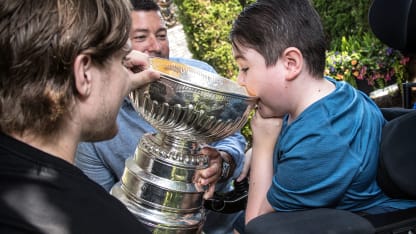
#
A MOMENT WITH LORD STANLEY
Owen's wheelchair has a rather large footrest. In fact, it's big enough to hold the Memorial Cup, which is given to the champion of the Canadian Hockey League, which consists of the Ontario Hockey League, the Western Hockey League and the Quebec Major Junior Hockey League.
When the London Knights beat the Rouyn-Noranda Huskies to win the Memorial Cup in 2016, Thomas brought the trophy to Owen, placed it on the wheelchair's footrest and knelt beside him for a once-in-a-lifetime photo opportunity that still - and probably will forever - hang in the McGonigal house alongside a signed Thomas jersey.
"That was the first big championship trophy he was able to see, so it was cool," Thomas said. "He couldn't make it out to Red Deer for our games because it isn't easy for him to fly, so I brought the Memorial Cup to him. I only had one day with it, and I spent some time at my place and then brought it to my billet house in London. The smile on his face just lit up."
Last June, when Thomas and the St. Louis Blues were playing in the Stanley Cup Final, exceptions were made for Owen's travel. The McGonigal family embarked on a long road trip for St. Louis to watch Game 3 of the Final at Enterprise Center in St. Louis.
An injury to Thomas kept him out of the lineup, and a lopsided Blues' loss to the Bruins made for a disappointing trip for Owen. But in less than two weeks, disappointment would turn to complete joy as the McGonigals, now back at home in London, cheered the Blues on for Game 7 on television.
"We were all glued to the TV watching every moment and when the final minutes were coming down and it looked like this was going to happen, it seemed so surreal," Angela said. "What the Blues accomplished and what Robert got to be part of was surreal. How many kids in their first year in the NHL get to hoist the Stanley Cup? We were just so happy for him. We saw him on TV, his mom and dad were there and we saw them, too. We were texting with his parents the whole time."
If Owen's face lit up when Thomas brought the Memorial Cup, imagine how it looked when he saw the Stanley Cup.
"It was 10 times more when he saw the Stanley Cup," Thomas said. "Right when he saw it, I put it on the footrest of his wheelchair to recreate the photo we had taken with the Memorial Cup a few years ago. He was tearing up, he was in so much shock, just so surreal that he had the Stanley Cup sitting right in front of him and he was able to touch it. It's something he will never forget."
"I remember that moment," Angela recalled. "I remember Robert said to Owen, 'I don't think I'm going to be able to fully rest it on your wheelchair this time. This one is a little heavier.'"
Owen McGonigal watches Robert Thomas in Arizona
FRIENDSHIP FOREVER
Thomas hasn't lived with Owen since he was traded to the Hamilton Bulldogs early in 2018, but he still keeps in touch regularly.
After he has a particularly good game, Thomas usually finds a text from Owen waiting on his cell phone saying how proud he is. And at least once a week - maybe more - the two catch up over the phone.
"He's such a special kid. He never lets anything get him down," Thomas said. "When he's at school, he needs a support worker to take his notes, and he can't participate in sports like the other kids, but I have never seen him complain. He is always so upbeat, so positive. I would come home from the rink and have a bad game or whatever, and he would just be postive. He puts things in perspective with what he has to go through, and how he's enjoying life despite the challenges.
"I think everybody needs someone like that in their life."
The McGonigals have friends in Arizona and visited them for the holidays. Because the Blues were playing the Coyotes soon after Christmas, they stayed in Arizona a bit longer to make sure they attended the game to cheer on Thomas.
"You know you can get exposed to germs on the airplane, and Owen picked up a virus and had been sick in bed three or four days," Angela said at the time. "His entire focus for those three or four days was I've got to get healthy enough to get to Robert's game. That was the goal - it was never 'I'm not feeling well, I'm sick at Christmas' - it was none of that. It was 'I'm going to stay in bed until I'm healthy enough cause I'm not going to miss seeing Robert in Arizona."
Because research has led to significant improvements in patients diagnosed with the disease in recent years, the McGonigals believe there might be a cure for spinal muscular atrophy in the future. When the NHL season resumes, Thomas and the Blues will team up to create a fundraiser and silent auction at a game to raise money to support that research.
"Owen deals with tough challenges every day, and often times he goes to public speaking events to share his story and share the ways he copes with those challenges every day," Thomas said. "It's very inspiring. If we can help a little bit, that's what I want to do. The kid means the world to me."
